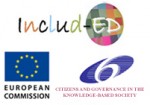Main documents:
Last recommendations for policy makers:
![]() Same resources, better results: Successful Educational Actions. This report’s main contribution are the policy recommendations that have emerged from the project results obtained through an intensive and rigorous scientific activities oriented to identify the Successful Actions and the ongoing dialogue that has been established with the major stakeholders in education, the four areas of society (housing, health, employment and participation) and vulnerable groups, for instance, civil society organizations, policy-makers, teachers and other professionals, including the end-users: students, families, community members, and others.
Same resources, better results: Successful Educational Actions. This report’s main contribution are the policy recommendations that have emerged from the project results obtained through an intensive and rigorous scientific activities oriented to identify the Successful Actions and the ongoing dialogue that has been established with the major stakeholders in education, the four areas of society (housing, health, employment and participation) and vulnerable groups, for instance, civil society organizations, policy-makers, teachers and other professionals, including the end-users: students, families, community members, and others.
Acces to the policy brief document on the European Comission website.
Other main recommendations:
1. Tracking should be avoided, and when this is not possible, it should be postponed. Research has shown that tracking (the segregation of students in different schools depending on their abilities and levels of attainment) reproduces or even increases educational and social inequalities.
2. Being placed in a vocational track should not block later access to academic education.
3. Inclusion actions should be promoted, especially for students from vulnerable groups in order to increase the school achievement of all students and improve inter-group relations in classrooms and schools. There are different inclusion actions that have proved to be successful: heterogeneous groups with reallocated resources, inclusive split classes, extension of the learning time (during school time and after school time), inclusive individualised curriculums, and inclusive choice.
4. Streaming (the separation of students through ability grouping within schools) reproduces or lowers the achievement of low performing students. Streaming should be avoided and substituted for inclusive ways of grouping students
5. Mixture, the way of organizing heterogeneous classrooms (where all students are together with the same teacher), needs to be overcome. In its place, the inclusion actions that are most successful in current informational era have to be promoted.
6. Policies should be developed to create and/or increase the participation of families and communities in learning activities (with students or for themselves), curriculum development and evaluation, and school decision-making
7. Participation of families from vulnerable groups (migrants, cultural minorities, and of students with disabilities) should be particularly encouraged as it relates to their children’s academic success.
8. Policies should be developed to promote family education programmes in schools.
9. Educational reforms and policies based on successful actions increase school success. Health policies are based on the attempt to guarantee the implementation of treatments that the scientific community has found to be successful.
